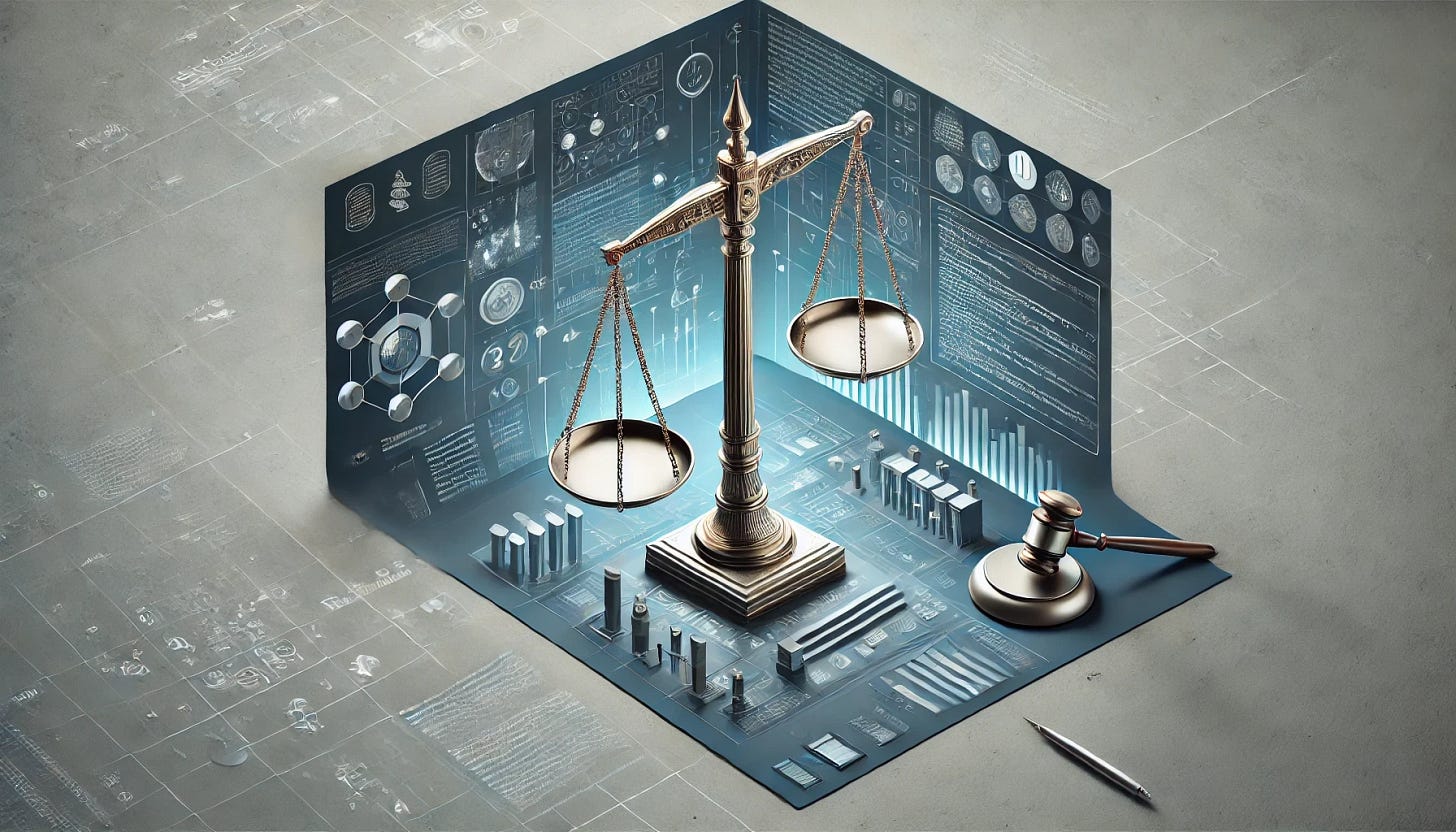Digital Forced Arbitration in an Era of Corporate Consolidation
Why Antitrust and Regulatory Bodies are Still Very Relevant in the Digital Age
Every single person reading this is in a forced binding arbitration contract with some service that they use. I am in writing this piece and you are in reading it, as Substack likewise has a binding arbitration clause in their legal Terms of Service. No, this isn't remotely unusual. No, at least in Substack’s case, this isn’t likely to come up as a problem. Is it a concerning trend?
As a Background
Forced arbitration recently reappeared back in the news cycle, largely owing to a recent Disney case in Florida. Briefly, it is a wrongful death lawsuit between a widower whose wife sadly passed after an allergic reaction to food prepared in a restaurant on grounds leased by Disney. The plaintiff's argument alleges that Disney is implicated in the lawsuit because of claims listed on their website about the restaurants they host on their property. Disney‘s lawyers had originally responded by attempting to remove themselves from the lawsuit, arguing that the plaintiff had agreed in 2019 to resolve all legal matters with Disney through arbitration when he signed up for Disney+. They argue further that the plaintiff in 2023 reaffirmed this agreement when he purchased Disney Epcot tickets online. Legal experts have pointed out that the facts of the case are not necessarily represented by the media accurately, but it is hard to agree with Disney when part of their argument rests on a completely unrelated service.
To take a step back, we should talk a bit about arbitration. Arbitration is, in layman’s terms, taking what would normally be a civil lawsuit out of the public courts and into a private one. Arbitration itself is not new, but the raw commercialization of mass forced arbitration is rather new. This is spurred onward by our digital society where extensive contracts can be easily signed without being read or fully understood. In most cases when you click that checkbox stating “I have read the Terms and Conditions” when signing up for an online banking service, social media account, or other digital product, you are contractually agreeing to settle potential matters out of court1. More exactly, you are waiving your Seventh Amendment right to a jury trial.
Some legal scholars have argued that following the Supreme Court’s decision in 2011 on AT&T Mobility LLC v. Concepcion, that there was an explosion of companies that transformed their terms of service to capitalize on that more lenient ruling on arbitration. While I believe that more research can and should be done here, I would argue that this could be a matter of convergent evolution: the Supreme Court’s decision came at a time when many services were shifting to digital platforms and thus needed new contractual terms. Concepcion therefore simply set a new standard at a time when standard-making was needed.
What does this mean?
The concept of arbitration is not necessarily a bad thing, especially in the context of the United States, but it is ultimately a wet band-aid trying to cover up a larger problem. Understand that the United States has a comparatively weaker regulatory framework than other legal jurisdictions, and while America’s citizens are sometimes called overly litigious, often a lawsuit is the only recourse for American citizens to pursue justice under the law. High-profile cases administered by the United States’ regulatory bodies against corporations often end up in the courts themselves. This policy decision, keeping regulatory bodies disempowered from pursuing cases outside of the court of law (and freshly reinforced with Chevron Deference overturned), is a driving reason behind why courthouses are so often behind on cases. Arbitration is an easy way out of this backlogged system.
Keep in mind that arbitration has a handful of additional advantages for a business that can be capitalized upon in the case of a consumer lawsuit. Firstly, the selection of an arbitrator is subject to both parties’ awareness of the given arbitrator’s impartiality—that is, if the arbitrator has business dealings with the business outside of the case, bias can be introduced without the other party being aware. Secondly, arbitrators are typically understood to be more conservative with payouts than public judges. Thirdly, public judges tend to side with arbitrators and arbitration is typically final and legally binding, so if there exists any error or issue over the course of the arbitration, such matters have to be resolved within the arbitration without a chance to appeal. Fourth and finally, what happens in arbitration is usually kept private and confidential between the parties present under the threat of losing whatever payout might come of the case, meaning that companies can dodge costly public relations battles in addition to the lawsuit. To put it simply, at the economies of scale that large and multinational corporations operate on, arbitration is a cheaper option than letting everything go to public courts.
Why does this matter?
A different case, McGinty v. Uber, makes for another good example into the details of why forced arbitration can be a problem. Briefly, the McGintys were in a crash while riding with an Uber driver and launched a lawsuit against both the driver and Uber. They racked up tremendous hospital and surgery fees in trying to reclaim normal mobility. Uber’s argument rests on that an individual authorized to use the wife’s phone (whom the paintiffs allege was their daughter) agreed to the Terms and Conditions outlined by Uber, and therefore agreed to arbitration, upon ordering food through the UberEats service. The case is currently in the New Jersey Superior Court after they released an opinion last week stating that the McGintys must resolve their issue with Uber in arbitration, but that the lawsuit against the driver can continue. The panel’s opinion stated that regardless of who agreed to Uber’s Terms and Conditions, that the contract was legally binding for the entire family, including the husband. Regardless of whether the McGintys have standing to bring Uber into the lawsuit, how common this legal argument is becoming is a concerning trend.
It is impressive how extensive simple, boilerplate, forced arbitration has become associated with nearly every service in the modern United States. The McGintys’ lawyer, Mike Shapiro, is right to point out that even grocery store loyalty programs employ forced arbitration clauses. What is starting to change seems to be the landscape of how far companies are willing to push the boundaries of exactly how enforceable these agreements are. To be clear, Shapiro’s job is partially to appeal to the public eye, and there is generally some fearmongering over forced arbitration in the United States. This however does not invalidate this completely valid concern. There are problems with arbitration as a whole that might involve a party not wanting to waive their Seventh Amendment rights to a jury trial, but in the digital service economy, this is typically not even an possibility.
And so we reach our ultimate argument: that the United States has a relatively unique problem with arbitration spurred by its hands-off policy decisions that ultimately fail the consumer. Other regulatory jurisdictions, like the European Union, do not have this same problem. There are two broad strokes that I would like to paint here.
The first is that the upcoming elections will have a dramatic and direct impact on how the United States proceeds concerning arbitration. The conservative-backed Project 2025 aims among many, many other things to gut many regulatory bodies and cut government overhead, which will likely increase judiciary burden and push even more cases into arbitration. Further, given conservative justices’ inclination towards business and arbitration, more conservative-appointed federal appeal judges would likely see an uptick in cases decided in favor of arbitration.
The second is that corporate consolidation has run rampant in recent decades. Looking at the digital world, where intellectual property and other non-physical assets can be easily transferred, expedites this process. The inevitable end of this sort of forced arbitration is that corporations will continue to find ways to pressure consumers out of their Seventh Amendment rights. There are arguments for and against corporate consolidation, but in both Piccolo v. Disney and McGinty v. Uber, there is a clear thread sewing these cases together: courts seem to be willing to enforce that procuring completely different services from company subsidiaries or brands still subjects the consumer to the same forced arbitration agreement. That should scare consumers, because it’s not clear currently where the line that enforces contractual arbitration ends.
There are many calls on the Democratic donor side currently that if Harris wins, to remove Lina Khan from her post as chair of the Federal Trade Commission, as well as Johnathan Kanter from his post as head of the Department of Justice Antitrust Division. If Trump wins, no doubt the result would be the same. Described as neo-Brandeisian, these two have spearheaded some of the biggest antitrust cases since United States v. Microsoft Corp. in 2001. If they and others are removed, without further action to arbitration, it is likely that we’ll see increased numbers of cases like Piccolo v. Disney and McGinty v. Uber.
So how do we change this?
Broadly, we can in the short-term push to keep media pressure on bigger companies to back down from these aggressive stances. This has already worked in the case Piccolo v. Disney, as Disney has backed down from its stance and has now agreed to let this specific case move forward. This is not a permanent solution, as people will begin to become used to this sort of story, weakening its potential as a catalyst for change. The short-term path for McGinty v. Uber is that it gets appealed to the New Jersey Supreme Court2, though I would suspect that the case would then at least make its way to the desk of the Third Circuit regardless of the decision there. Uber still aims to resolve their portion of the lawsuit in arbitration. Whether or not Piccolo v. Disney and McGinty v. Uber become the poster children for how arbitration cases are presented in the media going forward remains to be seen.
There are long-term goals to aim for. However, this starts with either marching down the path of a stronger regulatory framework like the European Union and/or limiting arbitration’s grip on the digital service economy by having Congress pass laws outlining when arbitration can and cannot apply. These actions inherently lend themselves to a stronger antitrust environment, but this trend has not yet solidified in any party now coming out of the Biden administration.
Broader implications for American society still need to be discussed. These seem to be glossed over out of sheer mundanity and acceptance at this point, but I think it’s healthy to revisit these questions. And so I’ll leave this newsletter asking the question that keeps running through my mind: if a right is so easily waivable, that by a simple half-of-a-second checkbox click, a consumer can waive a Constitutional right to a jury trial regardless of what happens over the course of using a service, is it actually a protected right?
Forced arbitration first came onto my otherwise tech-interested radar after the Equifax data breach in 2017. A good retelling of what Equifax did in response to that data breach can be found here, and is a sobering reminder of what companies will often try to do if they can get away with it.
My reading of the New Jersey court system is that the Superior Court’s opinion can only be appealed to the state Supreme Court in the case that the ruling is not unanimous, and this is not clear from the opinion document itself. An appeal for this case might instead go straight to the federal Third Circuit.




